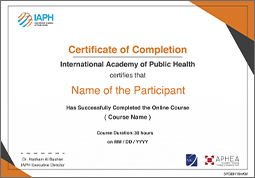Women’s health
Description
This Module provides a public health perspective of current women’s health issues. Scholars will have opportunities to critically explore a broad array of women's health concerns, considering the contextual factors. The Module content will emphasize the social, economic, environmental, cultural, behavioral, and political factors associated with women’s health.
Scholars will examine the programs and interventions, services, and policies that affect women’s health and methodological issues of gender-based research. Topics also include the following aspects: epidemiology of major women's health concerns, different reproductive health issues, gender and health, health care and access to health care services, violence, and aging.
Learning Outcomes
- Analyze women’s health issues relative to its public health implications
- Identify trends in major health conditions that affect women
- Understand the life Module perspective on women’s health and health care interventions, programs, and policies
- Identify major demographic, behavioral, and environmental factors that are associated with women’s health and how such factors may be incorporated into public health interventions, programs, and policies
- Describe current recommendations for prevention and early detection of cancer in women
- Comprehend the concept of gender-based research and basic health differences between women and men
- Understand how data collection and measurement problems can affect the validity of some women’s health indicators
- Understand the value and limitations of various tools that are used to measure and monitor women’s health
- Identify global perspectives and initiatives on women’s health
- Analyze women’s health issues relative to its public health implications
- Identify trends in major health conditions that affect women
- Understand the life Module perspective on women’s health and health care interventions, programs, and policies
- Identify major demographic, behavioral, and environmental factors that are associated with women’s health and how such factors may be incorporated into public health interventions, programs, and policies
- Describe current recommendations for prevention and early detection of cancer in women
- Comprehend the concept of gender-based research and basic health differences between women and men
- Understand how data collection and measurement problems can affect the validity of some women’s health indicators
- Understand the value and limitations of various tools that are used to measure and monitor women’s health
- Identify global perspectives and initiatives on women’s health

Duration:
30 Learning Hours
Accredited By:


Certificate

Are you interested in the course?
Get notified once the course is open by clicking on
Women’s health
Thank you for registering your interest! We appreciate your enthusiasm for this course. As soon as it becomes available, we will reach out to you with all the details. Stay tuned!